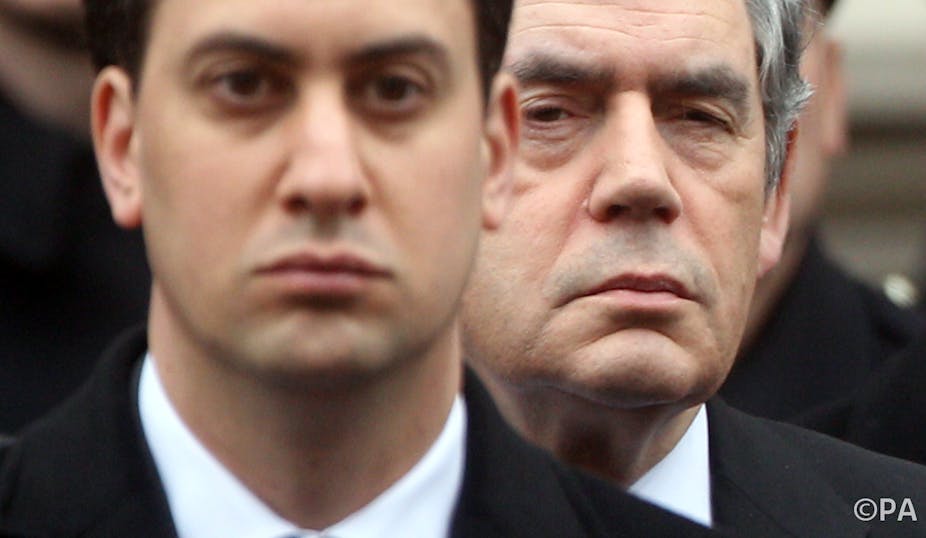No I don’t [accept that Labour overspent when it was last in power] … There was a global financial crisis which caused the deficit to rise. President Obama isn’t dealing with a high deficit because we built more schools and hospitals. He’s dealing with a high deficit because there was that global financial crisis.
Ed Miliband, Labour leader, in BBC Question Time Election Leaders Special.
Gordon Brown piled up debts, took us into the recession when we had a structural deficit that was out of control.
Michael Gove, Conservative party chief whip, speaking on BBC Radio 4’s World at One.
First, and it is important to state this, the Labour government was not responsible for the 2008 recession. The recession was caused by the housing bubble bursting in the US which led to subsequent financial crises in other countries.
One could argue, as the BBC’s Robert Peston does, that banks should have been under stricter regulation in the UK under the Labour government. However, this is easy to say with the benefit of hindsight and no other political party was arguing in favour of more regulation of the banking sector at the time. In fact, the Conservative party argued for less regulation of the banking sector.
What is a structural deficit?
The government is said to be running a deficit if within a year it spends more than it receives in taxes. This deficit must be funded by borrowing which adds to the total amount of debt that the UK currently owes.
A deficit is not necessarily a problem – it is a way of keeping your spending constant. When you pay your heating by direct debit you are more than likely going to have deficit in winter when it is colder and be in credit in summer when it is warmer.
The problem comes when you have a structural deficit. This is when over the economic cycle, the UK is still running a deficit. Or to put it another way, we still have heating bills to pay even after completing our direct debit payments.
Let’s talk about debt
Talking about debt, without talking about our ability to pay it back is completely useless. This is why economists talk about debt as a percentage of GDP and as the Oxford economist Simon Wren-Lewis points out, the debt to GDP ratio was not particularly high historically when the financial crisis hit in 2008.

The reason why this ratio increased post-2008 was largely due to the recession. In fact, post-2010 when the Conservative coalition took over, this ratio increased from 78% to over 90%. Although the coalition has brought the deficit down, there is still a deficit which we must pay off. Naturally, this extra borrowing increases the overall size of the UK debt. Furthermore, by bringing the deficit down too quickly it has reduced our ability to pay back the debt by lowering GDP.
This is not to say the Labour government behaved fiscally responsibly during its term in office with over-optimistic forecasts and problems with fiscal rules. In fact, some praise needs to be given to the coalition for setting up the Office of Budget Responsibility in May 2010 to combat some of these issues.
However, the coalition’s narrative – emphasised by Michael Gove – that somehow the Labour government was “out of control” with its spending is inaccurate. The reason this narrative is still persisting has as much to do with Labour’s ineptitude to dispel this myth as the media coverage of the issue.
Most importantly, even if we consider the debt to GDP ratio too high under Labour, this is not a reasonable justification for the coalition to impose austerity in a recession where interest rates are at their lowest point. To go back to the heating analogy, air conditioning is useless when it is freezing outside.
Verdict
If we knew that the financial crisis was about to happen then one could argue that Labour would have delayed some of the pre-crisis spending to help in buffering the impact of the recession. But this is easy to say with the benefit of hindsight. So on this basis, it is unfair to say that Labour “overspent”.
Review
This is a clear piece which sets out the key developments in spending and borrowing during the last Labour government. It clears up a good deal of confusion about these developments which, as the pieces notes, has been prevalent in much of the recent discussion.
It may be worth adding that any claims about the structural deficit need to be treated with caution. In principle, a country is running a structural deficit if the economy was operating at (or around) full capacity with no output gap – which the Office of Budget Responsibility describes as “the difference between the current level of activity in the economy and the potential level it could sustain while keeping inflation stable in the long term”. In practice, estimating the output gap for the UK is difficult. The OBR notes three different methodologies for doing so and estimates of the UK’s output gap vary considerably between economic forecasters.
For a complex modern economy, with a large services sector, it is far harder to estimate what full capacity is than for, say, an old-style production line factory. Claims that the UK had a structural deficit at a particular time are critically dependent on estimates of the output gap, and such estimates are subject to margins of error. – Jonathan Perraton
Click here to request a check. Please include the statement you would like us to check, the date it was made, and a link if possible. You can also email factcheck@theconversation.com

